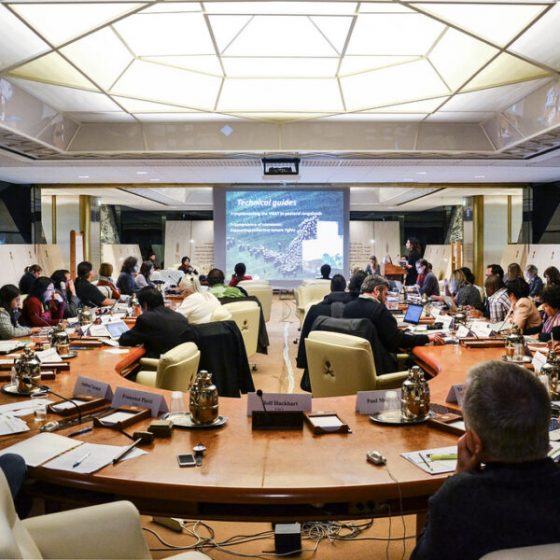
Large corporations and the Expense & Melinda Gates Structure took control of the United Nations Food Systems Summit, deserting little farmers on behalf of Big Ag business, endangering food sovereignty.
By Nils MCCUNE And Camila ESCALANTE
This September 23, the United Nations holds its Food Systems Topin New york city.
Under the guise of the UN system, and in spite of sleight-of-hand language about “equal opportunities,” this top represents a hostile takeover of world governance by business forces and the billionaire elite.
Today, social motions are defending democracy and against huge capital’s devastation of their lands, farms, and neighborhoods.
The United Nations is based upon the concept of multilateralism, where states seek tranquil options on the basis of equality and regard, replacing the colonialist institutions that preceded it.
That’s why for years, the United States government has actually rather pushed for things like G-7, NATO, and other kinds of control over geopolitics.
As reactionary governments have drawn back from multilateral organizations like the UN and the WHO, corporate stars have actually been moving in.
The World Economic Forum and its president Klaus Schwab have actually calmly pressed forward the “Davos Agenda”, now re-packaged as the “Great Reset”, a vast proposition changing conventional multilateral organizations with deceptive, unaccountable bodies run by corporations and the wealthy elite.
Their “multi-stakeholder capitalism” design is based upon the idea that public organizations are, by nature, inefficient.
Throughout the neoliberal shock treatment of the 1990s, the World Economic Online forum pushed the idea that corporations are more than simply profit-seeking cars, that they might be socially accountable.
Now Davos would argue that multinational corporations are social stars, which need to be consisted of to make decision-making truly democratic.
In doing so, Davos hijacked the gains of years of work by popular motions to open world governance to the needs of civil society– and did so utilizing corporate doublespeak to further entrench elite power.
Warship philanthropy
La Vía Campesinais perhaps the world’s largest social motion. Made up of 200 million little farmers, peasants, farm employees, and indigenous peoples, it has actually promoted the idea of food sovereignty as the right of peoples to manage and protect their own food systems using healthy, agro-ecological methods.
After years battling against free-trade agreements and the World Bank in the streets of Seattle, Cancun, and Seoul, La Via Campesina made an incursion into institutional politics, helping to prepare and bring the UN Declaration on the Rights of Peasants through 18 years of negotiations, till it was gone by the UN General Assembly in December 2018.
This statement protects the right of rural individuals to access land, water, seeds, and other resources in order to produce their own food which of their society.
Worldwide, 70% of food is produced by small farmers, who use only one-quarter of overall farmland.
On the other hand, the Expense and Melinda Gates Foundation developed the Alliance for a Green Revolution in Africa, or AGRA, in 2006.
AGRA promised to double yields and earnings for 30 million families while cutting food insecurity by half in 13 African nations by 2020.
Over the taking place decade, AGRA gathered almost $1 billion in donations, and invested $524 million on programs promoting making use of genetically customized and hybrid seeds, commercial fossil fuel-based fertilizers, and chemical pesticides.
As a powerful business lobby, AGRA pushed governments in Africa into contributing another billion dollars each year to fund agrichemicals and imported seeds sourced from United States and European agribusiness corporations, in addition to policies to privatize communal lands and decrease taxes on corporations.
After 14 years of mega-philanthropy’s knee on the neck of Africa, a 2020 Tufts University research studyshowed that, in AGRA’s 13 focus countries, hunger had actually leapt 30%, as farmers were pushed to abandon healthy, conventional polycultures to focus on monoculture fields of imported corn seed.
Opposition to AGRA’s corporate takeover of the African countryside belongs to what drove La Via Campesina and farmers throughout the continent to demand a place at the table in UN arguments about food.
After the world food crisis of 2008, the UN Committee on World Food Security was rearranged to allow social actors such as La Via Campesina to participate as non-voting delegates in debates about food policy.
3 successive UN Unique Rapporteurs on the Right to Food have largely endorsed La Vía Campesina’s propositions: redistributive land reform and agroecological farming can end hunger while dramatically minimizing agriculture’s contribution to problems like greenhouse gas build-up in the environment, pollinator population decrease, and freshwater deficiency.
The brand-new UN: a public-private collaboration
In June 2019, the workplace of UN General Secretary António Guterres, without previous conversation in the General Assembly or any other intergovernmental procedure, signed a tactical partnership with the World Economic Online Forum.
The secretary-general is expected to be the world’s leading supporter for multilateralism, the idea at the core of the UN. Instead, he has actually effectively endorsed multi-stakeholderism, the core concept of the Great Reset.
The 2021 UN Food Systems Summit was started through a collaboration with the World Economic Forum, with minimal participation of other UN bodies, such as the Food and Farming Organization or the Committee on World Food Security, which traditionally handle food policies.
In contrast to previous food tops, there was no intergovernmental body that convened the top.
The current president of AGRA, Agnes Kalibata, was called as special envoy to the summit, a clear sign of the hand of the Gates Structure.
The absence of transparency and business program of the summit were knocked in an open letter signed by more than 500 civil society organizationsin March 2020.
The top seeks to eliminate the last 15 years of progress in acknowledging human rights in food systems, and rather promotes incorrect services like “zero-net emissions”, “soil carbon rates”, and “a brand-new deal for nature”, that in practice put more control over land, biodiversity, and water in the hands of elite and secretive bodies run by corporations.

